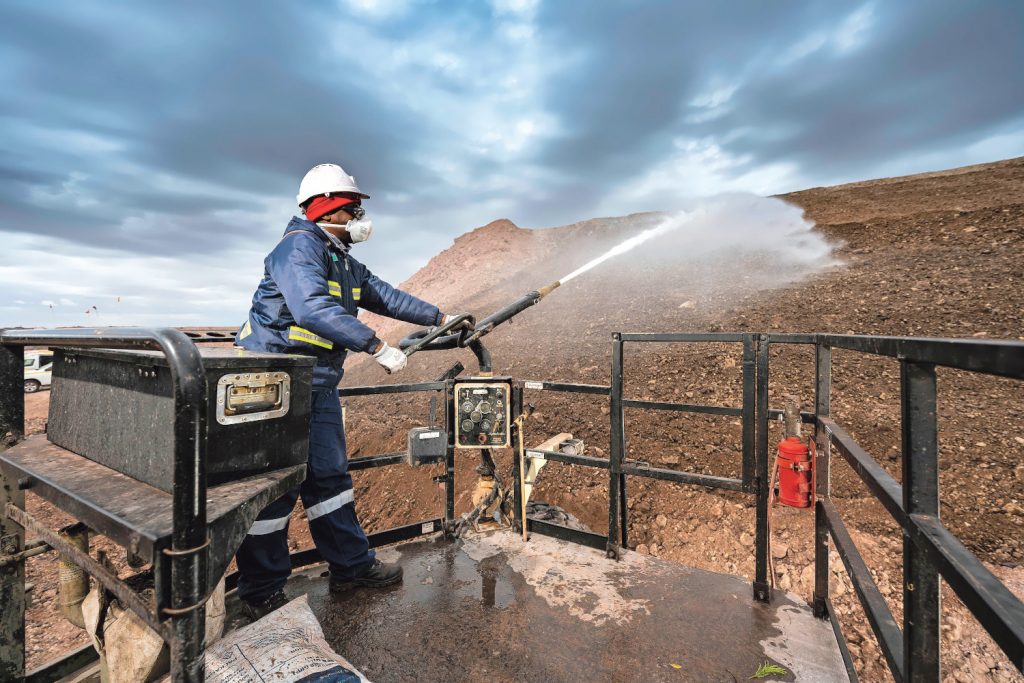In July 2021, corporates joined forces with residents of Alexandra township after widespread unrest swept South Africa. Less than a week after riots devastated the community, hundreds of volunteers took to the streets for a clean-up operation that lasted several days. (Photo: Kofi Zwana)
Strategic opportunities for societal change
It is no longer enough to deliver quality goods or stellar services at competitive prices — industry leaders and captains of business know that accountability and responsibility extend far beyond their shareholders and established client base. With society increasingly looking to business to fill the gaps where government and civil society cannot, corporate social investment (CSI) and corporate social responsibility (CSR) are integral to doing business today and in the future.
ESG refers to the environmental, social and corporate governance information of a specific company or organisation. According to the World Economic Forum (WEF) “ESG is CSR raised to a strategic priority, bringing transparency and accountability into the company’s environmental and social impacts”, and there is growing evidence showing companies that take these responsibilities seriously perform better financially.
According to the WEF, recent events have increased the focus on ESG: worker wellness was in the spotlight during the Covid-19 pandemic, social justice protests have highlighted gaps in diversity, equity and inclusion, and the impact of climate change is impossible to ignore. CSI initiatives aim to address these and other issues, from skills development and education to healthcare, unrest to disaster relief, food security to entrepreneurial support and diversity equity initiatives.
Amid increasing regulations, demands for transparency and the rise of ethical consumerism, more investors are shifting focus to these non-financial factors when it comes to decision-making, recognising ESG ratings as valuable corporate tools to evaluate and drive change in areas such as energy efficiency, worker safety, social impact and board independence.
Green bonds, the “New Amazon effect” driving net-zero supply chains, ESG-sensitive investment philosophies, the nexus of need and investability, the impact of corporate greenwashing, the intensifying push for global energy reform and the evolving role of natural and human capital in shaping corporate processes and practices — these are just some of the trends shaping the way we do business today.
According to social responsibility consultancy Trialogue, corporate South Africa’s R10.9 billion CSI spend for the 2022 financial year goes a long way in helping bring the country closer to United Nations (UN) Sustainable Development Goals (SGDs) Agenda 2030, the African Union Agenda 2063 and the Southern African Development Community’s Regional Indicative Strategic Development Plan, with which the National Development Plan (NDP) is aligned.
The subsequent “social return on investment” is not always immediately measurable in economic terms. When it’s done right, however, the outcomes are priceless, stretching beyond brand recognition and positive brand reputation, and result in increased sales and customer loyalty, operational cost savings, heightened financial performance, easier access to capital, organisational growth, and boosted talent attraction and retention.
Climate change ‘first among equals’ but SA bucks the trend
When it comes to the CSR and ESG principles driving current business trends, climate change is currently ranked “first among equals”. According to global investment and research firm MSCI’s 2022 ESG Trends to Watch report, it seems that the existential threat of rising temperatures and humanity’s race for survival as the clock runs out have eclipsed both governance and social issues, and top the CSI agenda for the year.
A 2022 report by Deloitte showed that of 2 000 C-suite executives surveyed across 21 countries, a staggering 97% said that their businesses are feeling the impact of global warming, with about half acknowledging that their operations have already been negatively affected.
This seems unlikely to change in the coming years. If global warming is limited to 1.5°C to 2°C above pre-industrial levels, the world may avoid catastrophic consequences; but even if this is achieved, the existing climate crisis and continued extreme weather events are here to stay. The United Nations (UN) has estimated that should this target be met, the annual spend to adapt to existing climate change will have to increase by five to 10 times more than the current spend.
But despite being a priority in boardrooms across the world, one survey found that only 18% of South African companies invest in environmentally-focused CSI projects, and about a quarter do not consider the environment at all when it comes to their CSI spend.
Ethical consumers drive the agenda
Over the last decade, CSI and ESG have gone from fringe to mainstream — the business decision-making of the future is intrinsically linked to ethical values, respect for people and the promotion of the natural environment. According to the Harvard Business Review, a new age of corporate social justice has dawned, defined as “a framework regulated by the trust between a company and its employees, customers, shareholders, and the broader community it touches, to explicitly do good by all of them”.
Customer loyalty is driven by companies that care, which means companies that care are driving the agenda. Around 67% of South African companies are already integrating ESG into their business strategies, with an increasing number of corporates investing in larger, longer-term projects.
Amid the global rising tide of ethical consumerism, 95% of South Africans expect company CEOs to publicly speak out on societal challenges, and 80% of Millenials and Gen Z consumers expect brands to take a stand on racism, homophobia and sexism. Seventy percent of Gen Z consumers say they actively try to support companies they consider ethical, and 65% try to learn the origins of anything they buy: where it was made, what it is made from, how it is made and by whom.
A report by management consultants McKinsey and Company says the influence of Gen Z is rapidly expanding: “Companies should be attuned to three implications for this generation: consumption as access rather than possession, consumption as an expression of individual identity, and consumption as a matter of ethical concern. The possibilities now emerging for companies are as transformational as they are challenging. Businesses must rethink how they deliver value to the consumer, rebalance scale and mass production against personalisation, and — more than ever — practise what they preach when they address marketing issues and work ethics.”
A corporate culture of caring bears internal fruit too
An increasing number of job seekers are also taking this into account as they make professional choices guided by personal values.
Talent attraction and retention are invaluable, especially as the business world struggles amid “the great resignation”, with ever more employees engaged in “quiet quitting” (doing the bare minimum that their job requires). Millennials and Gen Z employees seek more than just a pay cheque: they want connection, meaning, engagement and wellness in their chosen professions, in line with their personal values, world views and hopes for the future. Company culture and employee investment and growth cannot be underestimated.
Profit is important, but CSI is critical. Sustainability, empowerment, community upliftment, good governance and societal benefit must take centre stage as a new generation of ethical consumers — and value-driven employees — call the shots. People, planet and prosperity are the golden standards to aim for, and this new triple-bottom-line underlies every business interaction (and transaction) that plays out. CSI cannot be a silo, and ESG principles must be interwoven into the very fabric of a business if it is to succeed. When CSI is elevated from a mandatory expense to a strategic opportunity, companies have a chance to actualise real change.
This is no pipe dream
Committed industry leaders have shown time and time again the impact business can have when caring becomes company culture, and how this impacts not just shareholders but stakeholders at every level of operations and every tier of society. These corporate social investments deliver invaluable returns that stretch far beyond the bounds of traditional investments to change the world of tomorrow — and the world today. — Jamaine Krige
——————————————————————————————————————————————————————————————–
The business of business is NOT just business
The ripples of corporate actions are felt across the world
Corporate social investment (CSI), corporate social responsibility (CSR) and sustainability must be embedded in daily operations and cannot be external to other decision-making at a company. This is according to Liesel Kassier, Managing Director: Sustain at the Amekh Group. “Your CSI must be an outcome of a broader sustainability strategy and vision, a kind of True North in terms of the impact that you hope to make.”
 Liesel Kassier is the Managing Director: Sustain of the Amekh Group, a consulting firm that focuses on developing leadership capability and capacity, specifically within operations excellence, quality management systems and ESG and sustainability. (Photo: Supplied)
Liesel Kassier is the Managing Director: Sustain of the Amekh Group, a consulting firm that focuses on developing leadership capability and capacity, specifically within operations excellence, quality management systems and ESG and sustainability. (Photo: Supplied)
Kassier says both CSI and CSR are centred around acknowledging that companies have more than just profit-making responsibilities, and speak to the roles that corporate citizens should play in society. “Corporates have economic responsibilities, legal responsibilities, ethical responsibilities and then philanthropic responsibilities,” she explains.
Obviously, corporations must be economically sustainable before they can start making a contribution to society. This, however, does not mean that they cannot take steps to achieve that financial viability in an ethical and responsible manner.
Operational integration key to sustainability and success
She says criticism levelled against CSR and CSI initiatives stems from the fact that their implementation is often fragmented and completely separate from the core function of the business. “We must acknowledge that businesses are embedded in social and natural environments, and we will not make a significant change if we see these elements as external to operations.”
In the past, the environment was simply a place to extract resources and dump waste. “That is why we’re facing this climate crisis,” she says. “Companies have never seen the health of the business as directly related to the health of the society and of the natural environment that they are operating from.”
To date, she says, most ESG reporting has been superficial, but this is changing. “There are new reporting pressures around science-based targeting, which means companies are going to have to start reporting on accurate data,” she explains. “Those companies that actually have sustainability within their core strategy will have the necessary projects that they can report on.”
Reporting and submitting the tick boxes should be the last step, she says; the first is actually adopting a core strategy that speaks to sustainability and explores how to fundamentally change a business model that is no longer serving the planet, the community and therefore, in the long run, the company.
Proactive, future-focused system thinking for success
In recent years, both the Covid-19 pandemic and the climate crisis have forced industries to react to changes, but they also showed that reacting is not enough; businesses need a proactive, future-focused approach. “At the heart of this is the concept of systems thinking, because both these disruptors have showcased the importance of being able to broaden your thinking about the system and your role in it,” she explains. “Unfortunately, we haven’t gotten this right yet.”
The core notion of systems thinking is that every action undertaken has an impact on the broader system: “So you are not a lone agent in your company or industry; you must acknowledge that you are part of a bigger picture, and whatever you do has repercussions elsewhere. Even when we are looking for solutions we have to apply systems thinking, because the solutions we implement may have unintended consequences somewhere else.”
Incorporating sustainability into operational strategy and company culture may come at a cost, but the cost of doing nothing is much higher. Scientists, she explains, have identified nine planetary boundaries that must be respected if the Earth is to remain habitable. These relate to climate change, biodiversity loss or change in biosphere integrity, ocean acidification, ozone depletion, atmospheric aerosol pollution, freshwater use, biogeochemical flows of nitrogen and phosphorus, land-system change, and the release of novel chemicals.
The cost of doing nothing
According to the framework, “transgressing one or more planetary boundaries may be deleterious or even catastrophic due to the risk of crossing thresholds that will trigger non-linear, abrupt environmental change within continental-scale to planetary-scale systems”. In 2022, the fifth of these nine boundaries was crossed.
A similar framework, namely the Safe and Just Space Doughnut or doughnut economics, exists for social boundaries relating to issues such as education, housing, health, water and sanitation. “The cost of doing nothing is existential, both in terms of a natural environment that sustains life and from a socially destabilised environment that business cannot survive in,” Kassier says. “The health of your business depends on the health of the planet and the health of society, and we need a fundamental shift to ensure that wellbeing.”
Currently, she says, a lot of change is being driven by legislation: “Fortunately, there are those shining lights — those businesses that want to be part of the solution and incorporate it as one of their unique selling points. These companies, which are future-focused, solution-driven and proactive, will be the success stories of tomorrow.”
 Incorporating sustainability into operational strategy and company culture may come at a cost, but the cost of doing nothing is ultimately much higher.
Incorporating sustainability into operational strategy and company culture may come at a cost, but the cost of doing nothing is ultimately much higher.
It cannot be business as usual; there is too much at stake
It’s undeniable that the business world is changing, and that business interests have also shifted, from unapologetically shareholder-focused to a strong emphasis on stakeholder engagement. “In the 70s, Friedman said that the business of business is business,” she says, referring to economist Milton Friedman, who argued that the only social responsibility of business was to maximise profits.
“This has often been the argument when looking at driving profits and the extractive nature of doing business, but this is shifting because we must acknowledge that there is a broader set of stakeholders who are key to business success. I think this is one of the key changes of implementing sustainable business models. The environment and society are primary stakeholders because their health is critically linked to a business’s ability to function and be successful,” she explains.
Identifying the key stakeholders integral to business success and the risks and areas of concern to those stakeholders is one of the things that Kassier and the Amekh Group assist on. “We assist, then help our clients build that knowledge into a sustainability strategy and operation plan for the company,” she says. “This also entails guiding businesses in identifying, defining and redefining their purpose, before facilitating engagement with their supply chains, customers and employees to make sure that no one is left behind.”
So what does this look like in practice? “We try to be very practical and implement measurable, tangible outcomes. There is so much jargon within this ‘sustainability space’ and it is easy to get lost. We’re big on simplifying this space for companies and work on embedding these principles from the top down. This entails delving into communication strategies and education; so much of the work is unlearning old ways of doing things and embracing a mindset of change.”
Sustainability is driven by governance, the third ESG principle that must be considered. “Companies also need to relook at who has a seat at the table in terms of the governance structure, and whether that is representative of where they are operating from and where they are heading.”
Opportunities exist for those willing to embrace them
There are exciting things happening in the area of sustainable finance, she says. “We’re seeing that banks and financial institutions are looking for key projects to finance because they are under pressure to reach sustainability targets, so we also look at how companies can make use of this changing landscape.” She says there has been exponential growth in green bonds and social bonds, for example. “If you’ve got a core sustainability strategy that delivers tangible projects, your business is well positioned to explore these new options.”
At the end of the day, the core aspect of a business model is the concept of value: “If we can change how companies measure the value they are creating, and incorporate the social and natural environment into those measurements, we will have a better chance of driving the change we so desperately need.”
— Jamaine Krige
——————————————————————————————————————————————————————————————–
Amathube Sports Development Trust
Levelling the playing field and enabling opportunity through sport
Dries van Schalkwyk knows first-hand how sport can change lives. His professional rugby career spanned 14 years and opened countless doors to opportunities — he even got to play internationally, for Italy. Like the rest of South Africa, he watched with immense pride and joy as Siya Kholisi, born in the Eastern Cape, became the first black captain of the Springboks, and eventually led the team to victory in the 2018 Rugby World Cup.
 Junior Pokomela, a rugby union player for the DHL Stormers and ambassador of the Amathube Trust, says the support of the Trust has greatly impacted his life. (Photo: Ashley Vlotman/Gallo Images)
Junior Pokomela, a rugby union player for the DHL Stormers and ambassador of the Amathube Trust, says the support of the Trust has greatly impacted his life. (Photo: Ashley Vlotman/Gallo Images)
As a teenager, Kholisi was offered a scholarship to a prestigious semi-private school and overcame the odds stacked against him, but Van Schalkwyk was forced to ask himself: what about the children who never make it further than the community sports grounds in the township they call home? “It’s not enough to take some of these children out of the environment without doing anything to ensure that those left behind also stand a chance,” Van Schalkwyk explains. “It’s not enough to give those left behind a T-shirt and a cap and call it ‘engagement’. That doesn’t change their situation.”
Van Schalkwyk is the General Manager and Managing Trustee of the Amathube Sports Development Trust, an initiative that was formalised in 2020. “We are here to help bridge the gap for young people between the age of 15 and 22 years, and rugby is how we do it.” He believes those seven years are fundamental in shaping the direction of a young person’s life. “If you think about the gangs and the crime syndicates, what type of young men do they want to recruit? They’re going to target the ones who are big, who are fast, and who are smart … I’ve seen too many young black men with potential end up dead, just because they were overlooked by a scout and never made it onto the rugby field of one of the private schools in the cities.”
He acknowledges that not everyone will become the next Springbok captain. “You don’t need to play for a national or even a provincial team one day,” he explains. “Just use your skills to play for a varsity team and get your degree: if you can do that, then rugby has already changed your life.”
The Amathube Trust is about creating opportunities for young people, he emphasises, not just young men. “We have girls playing rugby too, and many of them go on to play at a university level or become referees and coaches,” he says. “Gone are the days when rugby was just for boys. Just take a look at the Women’s World Cup final in New Zealand — it was sold out, with more than 45 000 people in attendance, showing that women’s rugby matters.”
The organisation has big goals. It wants to reach 85% of scholars in the Eastern Cape; about 150 000 boys and girls. At the moment there are eight Amathube students in tertiary education, six Amathube players in rugby franchises (many played in SA age groups) and one Amathube Springbok. Zuki Tom started his journey with the trustees in 2016 at Breidbach Primary School and made his international sporting debut in September 2022, when he took to the field in the SA U18 team against France and England. “Our aim though is to have 20 Springboks by the 2031 World Cup,” says Van Schalkwyk.
The Trust partners with corporates that want to be a part of the journey, from a grassroots level right through to personal and professional success for the beneficiaries. “It’s amazing to think that your contribution, no matter how big or small, can shape the life of a young person and make a difference to them, not only today, but for the rest of their days going forward.”
The return on investment? “Every R1 invested in a child yields a return of R28.50 in lifetime earnings.” The programme also focuses on training, educating and empowering rugby support staff. “We are training a network of officials who will manage our youth to a World
Rugby standard to create consistency and momentum from within,” he says. Through their involvement with the trust, the initial 64 coaches, officials and referees will receive accreditation and certification to allow them to formalise and monetise their love of the game, taking it beyond the borders of their hometowns. “It’s all part of a bigger ecosystem, and we hope that the benefits extend to everyone who comes into contact with the work we are doing.”
Rugby is more than a game, he explains: “The global demand for rugby staff — players, coaches, referees, managers and officials — is expected to double between now and 2031, which is just staggering if you think about it, especially in terms of employment opportunities. There are going to be enough opportunities for 50 lifetimes, and the Eastern Cape has diamonds: passionate young people who are hungry for a better life. At Amathube, we want to connect those young people to those opportunities.” — Jamaine Krige
‘I’ve been blessed with success beyond my humble expectations’
Junior Pokomela is a rugby union player for the DHL Stormers and ambassador of the Amathube Trust: “My only goal when I was a young boy was to be one of the few in my family to get through school and university and make a success of myself so that I could provide for those close to me. Having grown up in areas where sport was not very accessible, I never dreamed of becoming a professional rugby player.
“My life was forever changed by the incredibly generous support given to me by Nigel Bands, one of Amathube’s trustees. I was given the opportunity of becoming successful beyond my humble expectations. The continued support offered to me has greatly impacted my life, and I look forward to seeing countless others who will have the same opportunities as I have had through the work of this organisation.”

Sports development: Small CSI spend for 2022
A 2022 report by corporate social responsibility consultancy Trialogue found that support for sports development has declined over the years, with 18% of companies contributing an average of 2% of the year’s overall CSI spend. In 1998, around 37% of companies invested in sports development.
According to the Trialogue report, even in the aftermath of South Africa’s 1995 World Cup victory, sports-focused initiatives have always constituted a small portion of the average CSI spend.
Soccer remains the most popular sport for corporates to back, garnering more than half (51%) of the CSI spend. For the first time in years, the spending on cycling is up, attracting 11% compared to 10% in 2021.